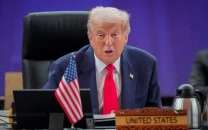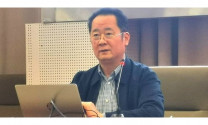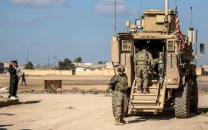ICC launches probe into prosecutor Karim Khan's misconduct allegations
Khan, who has served as the ICC prosecutor since 2021, has been accused of sexual misconduct by a former colleague
1731141429-0/BeFunk_§_]-(57)1731141429-0-640x480.webp)
The International Criminal Court (ICC) is set to conduct an external investigation into allegations of sexual misconduct involving its chief prosecutor, Karim Khan.
Sources familiar with the matter confirmed that the ICC's governing body will oversee the inquiry after the allegations were reported last month.
The investigation follows concerns raised within the court, with many staff members questioning the independence of the internal probe.
Khan, who has served as the ICC prosecutor since 2021, has been accused of sexual misconduct by a former colleague, a female lawyer who reported directly to him.
The allegations include unwanted physical contact, coercive behavior, and abuse of authority during a period spanning over a year. Khan has denied all accusations, stating he will cooperate fully with the investigation.
In 2018, Palestine referred the situation in its territory to the ICC for investigation into past, ongoing, and future crimes under the court's jurisdiction.
After five years of deliberation, the ICC agreed in March 2023 to open an investigation into the situation.
By November 2023, South Africa and five other nations submitted another referral, prompting Chief Prosecutor Karim Khan to extend the probe to the escalation of violence since the October 7, 2023, attacks.
It took Khan seven months to recommend arrest warrants for Israeli leaders Netanyahu and Gallant, despite ample evidence of their involvement in alleged war crimes in Gaza.
Khan also called for warrants for three Hamas leaders, two of whom were killed by Israel.
The delay in action likely reflects the intense pressures Khan faced, including the threat to his predecessor, Fatou Bensouda, by Mossad during her war crimes investigation.
Given the level of evidence, the decision now lies with the ICC judges, whose refusal to issue the warrants would severely damage the court’s credibility. The ICC must act swiftly, or risk undermining its legitimacy.
An internal ICC document circulated among member states recently recommended that Khan temporarily step down while the inquiry takes place.
While sources say the court is under pressure to ensure the investigation remains impartial, there are concerns about potential conflicts of interest.
The new head of the court’s internal oversight body, set to take office in December, previously worked in Khan’s office, raising doubts about the independence of the process.
Some staff members have voiced their concerns, arguing that the internal oversight mechanism (IOM) could be compromised.
As the investigation progresses, Khan's office has referred all media inquiries to his legal representatives, who have yet to comment on the specifics of the case.
The allegations come at a delicate moment for the ICC, as Khan's office is handling high-profile investigations, including a request for arrest warrants for Israeli leaders over alleged war crimes in Gaza.
The timing of the misconduct claims has led to accusations that they may be part of a broader campaign to discredit the ICC at a time when it is facing increasing political pressure, particularly from those critical of its operations in relation to the Israel-Palestine conflict.
Khan himself has suggested that the allegations are part of a misinformation campaign, linking them to his recent legal actions.
In response to the growing controversy, Khan requested the court’s internal watchdog, the Independent Oversight Mechanism, to conduct a formal inquiry into both the allegations and what he described as "disinformation" surrounding the case.
The ICC staff union has called for an independent, external investigation free from potential conflicts of interest.
The union has expressed concern that the court’s internal processes may not guarantee the necessary confidentiality and impartiality to address the allegations fairly.
As the investigation into Khan's conduct unfolds, the ICC’s governing body, the Assembly of States Parties (ASP), is expected to deliberate on the best approach to ensure transparency and accountability.
This includes discussing whether Khan should step aside temporarily, as recommended by the internal document.
Recently, South Africa submitted evidence to the International Court of Justice (ICJ) alleging that Israel has committed genocide in Gaza, according to a statement from President Cyril Ramaphosa's office.
The document claims Israel violated the genocide convention by promoting the destruction of Palestinians in Gaza, a charge Israel strongly denies. The ICJ confirmed receipt of the evidence but declined to provide further details.
The ICC, based in The Hague, is a global institution responsible for prosecuting individuals accused of war crimes, crimes against humanity, genocide, and the crime of aggression.
Khan's role as chief prosecutor is crucial in maintaining the integrity and credibility of the court, making the outcome of this investigation particularly significant.
The ICC's annual meeting is scheduled for next month, and the investigation is likely to be a key topic of discussion among the member states.



1701351241-1/Afghan-refugees-(3)1701351241-1-208x130.webp)















COMMENTS
Comments are moderated and generally will be posted if they are on-topic and not abusive.
For more information, please see our Comments FAQ